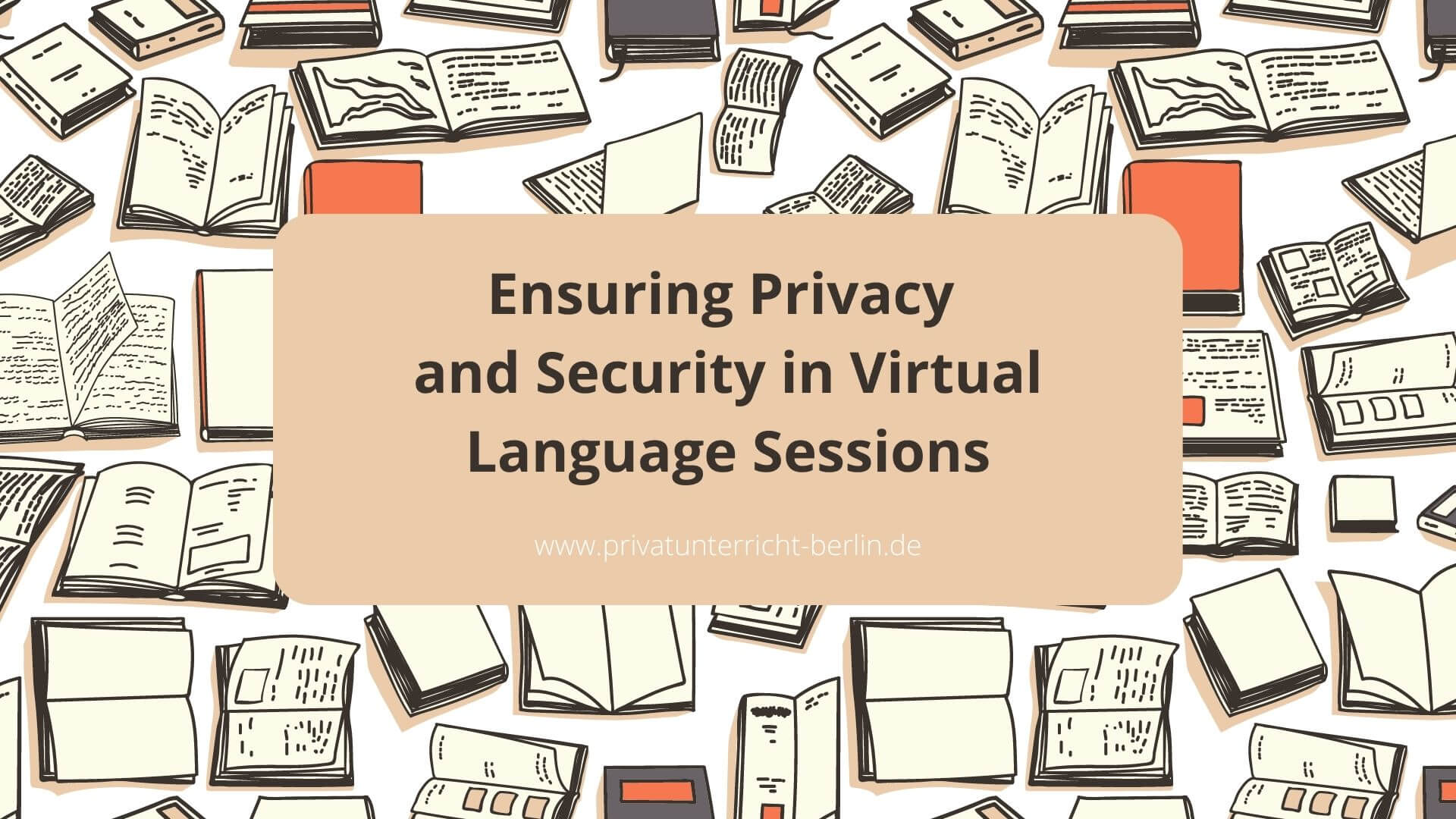Your Language Journey, Your Way: Start with a Private Tutor

Ensuring Privacy And Security In Virtual Language Sessions
As a virtual language security expert, I understand the importance of ensuring privacy and security in online language sessions. With more people turning to virtual platforms for language learning, we must take steps to protect our personal information and maintain secure communication channels.
In today’s digital age, cyber threats are becoming increasingly sophisticated, posing significant challenges to individuals and organizations seeking to keep their data safe. The risk of unauthorized access, data breaches, and other forms of cybercrime can be particularly concerning when it comes to language sessions that involve sensitive information.
In this article, we will explore some best practices for ensuring privacy and security during virtual language sessions so learners and educators can carry out their activities with peace of mind.
Table of Contents
Identifying Potential Security Risks
What are the potential security risks that come with virtual language sessions?
As a virtual language security expert, conducting a risk assessment to identify and address these concerns is essential.
One central area of concern is data privacy. Virtual language sessions often involve exchanging personal information such as names, email addresses, and sometimes even sensitive details like credit card numbers or medical conditions. Language service providers must have strong privacy policies to protect this information from unauthorized access.
Another potential security risk is cyber attacks. Hackers can break into virtual language session platforms and collect user data or disrupt the session altogether. This can lead to confidential information being leaked or lost, causing severe legal and reputation harm.
Proper authentication processes and safeguards like encryption technology and regular system updates must be implemented to mitigate these risks. By proactively identifying and addressing these potential threats through thorough risk assessments, virtual language service providers can ensure safer and more secure experiences for their users.
Implementing Strong Passwords And Authentication
Password management and strong authentication measures ensure privacy and security during virtual language sessions. Weak passwords or reused credentials can make accessing sensitive information easier for unauthorized individuals, so password management should be a top priority.
To implement strong passwords, it’s essential to create unique combinations of letters (uppercase and lowercase), numbers, symbols, and special characters. Avoid using easily guessable phrases such as ‘password123’ or personal information like birth dates or addresses.
Additionally, consider implementing two-factor authentication (2FA) to provide an extra layer of security. 2FA requires users to enter their password and another form of identification, such as a code sent via text message or email.
By utilizing these best practices for password management and incorporating 2FA into your virtual language sessions, you can significantly reduce the risk of unauthorized access. However, it’s important to remember that even with strong passwords and authentication measures in place, communication channels and platforms must also be secure. The following section will discuss ensuring secure communication during virtual language sessions.
Utilizing Secure Communication Channels And Platforms
Let’s start by discussing encryption and authentication, the fundamental building blocks for secure communication. We then need to consider the various network security measures, such as firewalls, access control, and two-factor authentication, to protect our data.
Encryption
Hey there! As a virtual language security expert, I understand the importance of data privacy and secure communication methods during virtual language sessions.
One key aspect of ensuring this is encryption. Encryption involves scrambling information so that someone with the correct decryption key can only read it. By using encryption protocols like AES or RSA, you can protect your data from being intercepted and read by unauthorized parties.
This ensures that any sensitive information discussed during virtual language sessions remains confidential and safe from prying eyes. Remember, when it comes to online communication, taking extra precautions for data privacy is always better than regretting not doing enough later on.
Authentication
Now that we have covered encryption, let’s move on to another critical aspect of secure communication: authentication. Authentication involves verifying the identity of a user before allowing them access to sensitive information or systems. It is crucial to ensure that only authorized parties can participate in virtual language sessions and prevent unauthorized access.
Various authentication methods are available, such as Two-Factor Authentication (2FA) and Biometric Authentication. With 2FA, a user needs to provide two forms of identification before gaining access – usually something they know (like a password) and something they have (like their phone). Biometric authentication uses unique physical characteristics like fingerprints, iris scans, or even facial recognition for verification.
By implementing strong authentication measures, you can mitigate the risk of data breaches or unauthorized access during virtual language sessions. In short, combining encryption and authentication techniques for online data privacy management is essential.
Protecting Personal Information And Data
As we continue to explore the importance of secure communication channels and platforms, it is crucial that we also focus on protecting personal information and data.
While utilizing encryption technologies can effectively ensure privacy, it’s also important to have user consent policies in place. This means clarifying how their data will be used and stored, so participants can make informed decisions before joining virtual language sessions.
Data encryption strategies are becoming increasingly essential for online security measures. End-to-end encryption ensures that only intended recipients can access confidential conversations or files shared during virtual language sessions.
Additionally, implementing strict user consent policies can help protect against potential data breaches by limiting the amount of personal information collected from participants. Educating users on cybersecurity best practices helps prevent attacks and creates a culture of awareness surrounding virtual language session privacy and security.
Educating Participants On Cybersecurity Best Practices
As a virtual language security expert, it’s essential to educate participants on best practices for cybersecurity.
One of the most significant risks in online communication is social engineering tactics used by hackers to gain access to personal information. These can include phishing emails or fake websites that seem legitimate but are designed to steal your login credentials. To prevent falling victim to these attacks, participants must understand how to recognize and avoid them.
This includes being cautious when clicking on links from unknown sources, never sharing sensitive information with untrusted individuals, and consistently verifying the authenticity of any website or email before providing any information.
In addition to educating participants about social engineering tactics, it’s also essential to provide them with specific steps they can take to protect themselves against phishing attacks. Some effective prevention methods include setting up two-factor authentication for all accounts, using strong passwords that are changed regularly, and keeping software up-to-date with the latest security patches.
By following these tips and staying vigilant against potential threats, participants will be better equipped to secure their private information during virtual language sessions.
Frequently Asked Questions
How Do Virtual Language Sessions Compare To In-Person Sessions In Terms Of Privacy And Security?
Imagine a virtual language session as a glass house, where anyone outside can easily peep in and observe what is happening inside. Now compare this to an in-person session, where the classroom walls provide a sense of privacy and security.
The rise of virtual language sessions has brought about privacy concerns not present in traditional classrooms. With online platforms being vulnerable to hacking and unauthorized access, there’s always a risk of sensitive information being leaked or shared without consent.
As virtual language security experts, we understand these risks all too well and work tirelessly to ensure our client’s safety. We implement end-to-end encryption, two-factor authentication, and secure network connections to mitigate potential threats.
We aim to ensure that participants can enjoy their virtual language sessions with peace of mind knowing they’re protected from any malicious activity while learning a new language.
Are There Any Specific Regulations Or Laws That Virtual Language Session Providers Need To Comply With To Ensure Privacy And Security?
Virtual language session providers must comply with legal regulations and data protection laws to ensure the privacy and security of their clients.
Privacy policies are essential in outlining how personal information is collected, stored, and used during virtual sessions.
Security measures such as secure login processes, encryption technology, and firewalls should also be implemented to prevent unauthorized access or cyber-attacks.
As a virtual language security expert, it’s crucial to stay up-to-date on the latest developments in online safety protocols and continuously assess risks to increase protection for all parties involved.
By prioritizing legal compliance, data protection, privacy policies, and security measures, virtual language session providers can create a safe environment for learning without compromising confidentiality or risking sensitive information leaks.
How Can Participants Ensure Their Devices Are Secure And Free From Malware Before Joining A Virtual Language Session?
Imagine your device is like a car. You wouldn’t take off on a road trip without checking the oil, airing up the tires, and ensuring it’s in good condition.
So why would you join a virtual language session without ensuring your device hygiene? Malware protection should be at the top of everyone’s mind when joining any online activity – especially those that involve sharing personal information.
As a virtual language security expert, I urge all participants to check their devices for malware before joining any sessions to ensure privacy and avoid potential cyber threats. Don’t let neglecting something as simple as device hygiene put you at risk – take precautions and protect yourself from harm.
What Steps Can Be Taken To Prevent Unauthorized Access Or Hacking Of Virtual Language Session Platforms?
As a virtual language security expert, it is essential to take proactive steps to prevent unauthorized access or hacking of virtual language session platforms.
One effective measure is implementing encryption protocols that protect the data transmitted during the session.
Two-factor authentication can also ensure that only authorized individuals have access. This method requires participants to enter a password and another form of identification, such as a fingerprint scan, before gaining entry into the platform.
By utilizing these measures, participants can rest assured that their sessions are secure and protected from threats.
How Can Virtual Language Session Providers Ensure That Participants Are Who They Claim To Be And Prevent Impersonation Or Identity Theft?
Virtual language session providers can ensure the security and authenticity of their participants through various verification methods such as two-factor authentication, biometric identification, or facial recognition.
Fraud detection tools are also employed to identify any suspicious activity during the sessions.
As a virtual language security expert, it is crucial to understand that participant impersonation and identity theft pose significant risks in an online environment.
Therefore, robust verification processes are necessary to maintain safe and secure virtual learning environments.
By doing so, organizations can build trust with their clients while ensuring privacy and security in every virtual interaction.
Conclusion
As a virtual language security expert, I must ensure that privacy and security are the top priorities when conducting any language session online. The shift towards virtual sessions has made it easier for people to learn languages from anywhere worldwide, but this convenience comes with potential risks if not managed properly.
According to recent studies, 73% of consumers are concerned about their personal information being compromised using video conferencing tools such as Zoom or Skype. This highlights the need for virtual language providers to take extra precautions when securing participants’ data and devices during these sessions.
We can significantly reduce the risk of unauthorized access or hacking by implementing two-factor authentication, end-to-end encryption, and regular software updates.
In conclusion, virtual language sessions have become an essential part of our lives today. However, ensuring privacy and security should never be overlooked. Both providers and participants must take the necessary steps before joining any session to prevent malware infections or identity thefts.
As technology evolves rapidly, so make cyber threats; therefore, staying vigilant and informed is critical in protecting ourselves from digital vulnerabilities.



